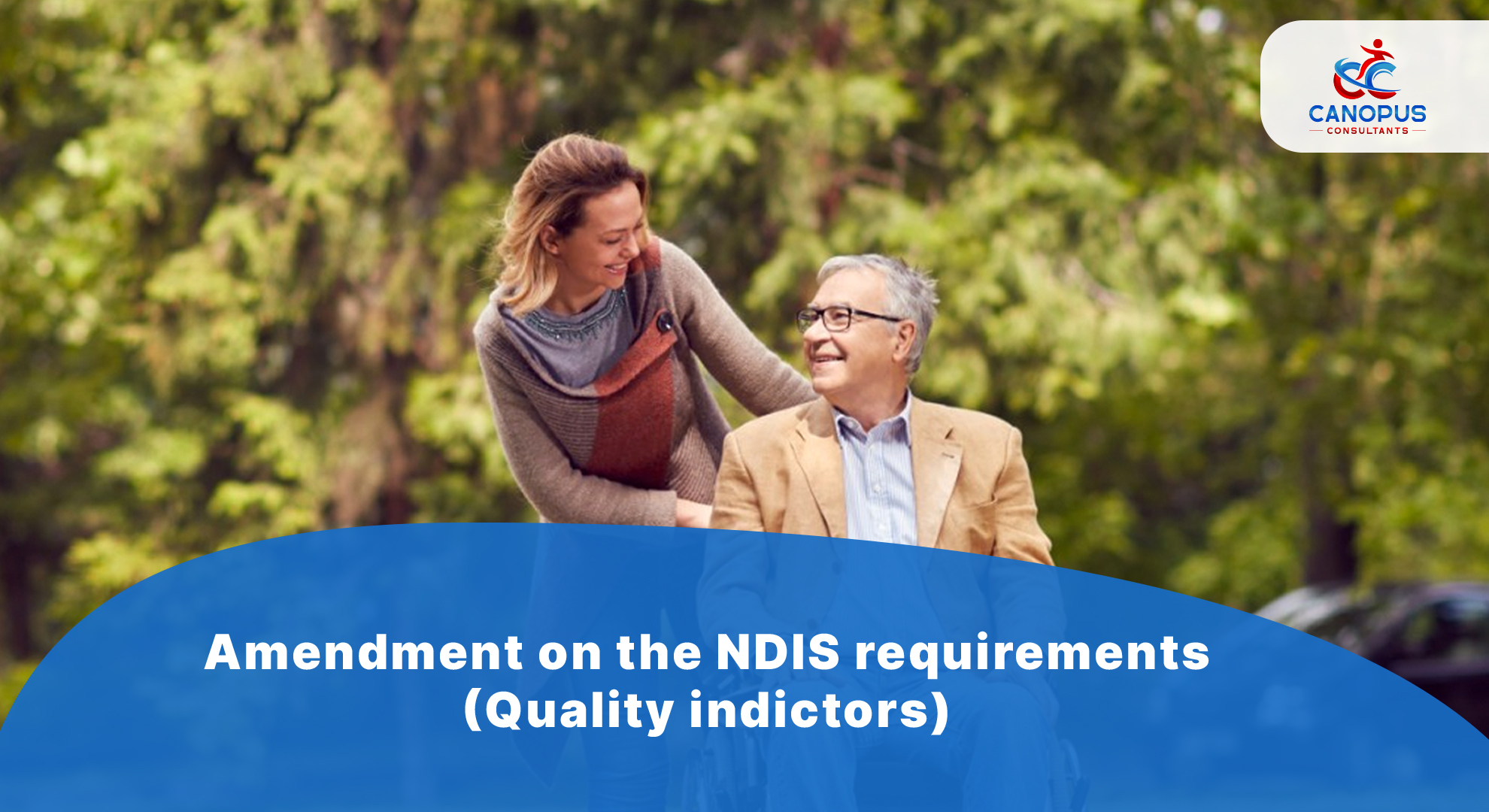
Amendment on the NDIS Requirements (Quality Indicators)
The NDIS Quality Indicator (QI) program assesses NDIS providers based on specific criteria. The amendment will ensure the indicators are up-to-date, relevant and achievable.
The amendment to the NDIS requirements is about improving the quality of services and supports for people with disability. It addresses several issues, including:
- Ensuring that providers have systems and processes in place so they can meet their obligations under the law;
- Clarifying when providers must get prior approval from us before making certain changes to their service or support arrangements; and
- We require providers to give notice to us if they stop providing any type of service or support because they no longer have enough money left in their budget allocation.
Amendments to three NDIS Practice Standards
The NDIS Practice Standards are a set of requirements that providers must meet to be eligible for registration. They are made up of four standards:
- Service delivery, which includes quality indicators and practices related to how you provide services
- Financial management and governance, which includes financial reporting practices and governance frameworks for your organisation
- Risk management, which includes risk identification processes, risk management strategies, incident response plans and other elements related to managing risks associated with providing services under the NDIS
- Quality assurance and improvement (QAI), including QAI frameworks such as quality improvement plans or systems audit programs
The NDIS Quality Indicators (QI) program assesses NDIS providers based on specific criteria.
The NDIS Quality Indicators (QI) program assesses NDIS providers based on specific criteria. The QIs are used to determine whether a provider has met the minimum requirements for delivering quality services to people with disability and their families, friends and carers under the NDIS.
Quality Indicators
Quality Indicators are a measure of the quality of care provided to people with disabilities. They are used to inform decision-making by people with disabilities, carers and families, service providers and governments.
The NDIS Quality Indicator Framework includes three categories:
- Core quality indicators – these should be consistently reported across all states and territories by all providers receiving funding from the NDIS;
- Additional quality indicators – these can be reported on at the discretion of an individual service provider or state/territory based on their specific needs;
- Emerging indicators – This group is being developed as part of the NDIS Research Agenda 2020 (R2020).
Amendment on the NDIS requirements (Quality Indicators) – what does this mean?
- The NDIS Quality Indicators (QI) program assesses NDIS providers based on specific criteria.
- The amendment will ensure the indicators are up-to-date, relevant and achievable.
What is the NDIS Quality and Safeguards Commission?
The NDIS Quality and Safeguards Commission (NDIS QSC) is an independent statutory authority established by the NDIS Act 2013. The NDIS QSC is responsible for overseeing the quality of NDIS providers, including through the NDIS Quality Indicators program.
The NDIS QSC has developed a set of quality indicators that align with current Australian standards and best practices in disability services. These indicators will be used to assess whether or not organisations meet these standards as part of their accreditation process with us.
How will we know how well services are performing?
The NDIS Quality Indicators (QI) program assesses NDIS providers based on specific criteria. The amendment will ensure the indicators are up-to-date, relevant and achievable for each provider type so that we can be sure that all people with disabilities are receiving quality services.
Why has it been established and what is it?
The NDIS Quality and Safeguards Commission (the Commission) was established by the National Disability Insurance Scheme Act 2013 (NDIS Act), which was passed by both houses of Parliament in November 2013.
The Commission is a Commonwealth Government agency, located at Level 8, 1 O’Connell Street in Canberra. The role of the Commission is to develop and implement quality indicators for participants who receive support through their Plan under the NDIS.
New Practice Standards and Quality Indicators
The following Practice Standards and Quality Indicators are new to the NDIS:
Mealtime Management
This refers to a set of standards and indicators related to how individuals’ mealtime needs are managed within the context of their disability support. It may include aspects like meal planning, preparation, feeding assistance, and ensuring that dietary requirements and restrictions are properly addressed.
Severe Dysphagia Management
This involves standards and indicators focused on the care and support of individuals with severe dysphagia, a condition where a person has difficulty swallowing. These standards likely encompass strategies for safe eating, preventing choking, and ensuring proper nutrition and hydration for those affected by this condition,
Emergency and Disaster Management (to be completed by 2020)
By the year 2020 (or beyond), NDIS providers are expected to develop and implement standards and indicators related to emergency and disaster management. This would involve planning for how to support people with disabilities during emergencies or natural disasters, ensuring their safety and well-being.
Personal Care Management in the admission phase (to be completed by 2021)
This refers to the standards and indicators that guide the assessment of an individual’s personal care needs. It likely involves evaluating the level of assistance and support required for daily tasks such as bathing, dressing, grooming, and toileting. This phase helps establish the appropriate level of care for each person.
These Practice Standards and Quality Indicators are designed to set guidelines for service providers under the NDIS to ensure that individuals with disabilities receive comprehensive and high-quality support across various aspects of their lives.
A new Code of Conduct for providers
Providers must comply with the Code of Conduct, which includes reporting against the NDIS quality indicators. They are also required to report on their compliance with the Code of Conduct and provide a statement to the NDIS Quality and Safeguards Commission (QSC).
The QSC is responsible for monitoring provider compliance with both Codes, as well as managing any complaints about providers.
Informing Decision-Making: Role of Quality Indicators
Quality Indicators are a measure of the quality of care provided to people with disabilities. They are used to inform decision-making by people with disabilities, carers and families, service providers and governments.
Quality Indicators are based on:
- An understanding of the person’s needs and how these can be met.
- Working in partnership with consumers (and families where appropriate).
- Addressing barriers to participation such as environmental factors or social support networks that may enable or constrain engagement in particular activities.
- Providing timely access to services/supports/activities etc. as required by each consumer’s plan.
Sustained Data Management: Ensuring Ongoing Balance
The NDIS Quality Indicator Work Program is one of the key outcomes of the original Quality Indicators agreement between the Commonwealth Government, state governments and non-government organisations. The program ensures that there is an ongoing balance between data collection and reporting.
This means that as new information is collected regularly, it can be used to inform decisions about improving the quality of services provided under the NDIS at a national level.
Effective Management: Optimizing Service Delivery
The work program aims to improve the quality of services for people with disabilities through better monitoring, management and reporting of NDIS-funded services. The work program is one of the key outcomes of the original Quality Indicators agreement between the Commonwealth Government, state governments and non-government organisations.
The NDIA has developed an online toolkit that helps providers meet their obligations under the new requirements.
Advancing Disability Support Practices
Quality Indicators are a measure of the quality of care provided to people with disabilities. They are used to inform decision-making by people with disabilities, carers and families, service providers and governments.
The NDIS Quality Indicators help to ensure that participants receive high-quality support through their plan’s funding when they need it most. The NDIS Quality Indicators also encourage innovation in practice so that we can continually improve the way we support people with disabilities across Australia.
Conclusion
The NDIS Quality Indicators (QI) program assesses NDIS providers based on specific criteria. The amendment will ensure the indicators are up-to-date, relevant and achievable. The NDIS Quality Indicators (QI) program assesses NDIS providers based on specific criteria. The amendment will ensure the indicators are up-to-date, relevant and achievable.


